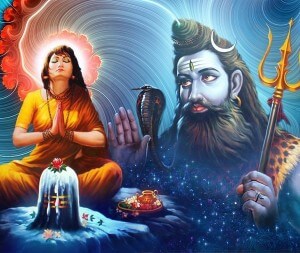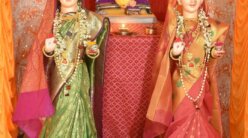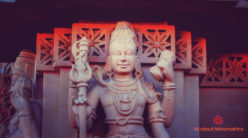 Mahashivratri is an auspicious and important festival of hindus, especially for the devotees of Lord Shiva who celebrate the religious festival with great enthusiasm. Mahashivratri festival, also much popular as ‘Shivratri’ or ‘Great Night of Lord Shiva’. Hindu’s observe it on the 13th night or 14th day in the krishna paksha every year in the month of Phalguna or Maagh according to the Hindu calendar. Devotees on mahashivratri throng to temples and holy shrines to offer prayers and please Lord Shiva.
Mahashivratri is an auspicious and important festival of hindus, especially for the devotees of Lord Shiva who celebrate the religious festival with great enthusiasm. Mahashivratri festival, also much popular as ‘Shivratri’ or ‘Great Night of Lord Shiva’. Hindu’s observe it on the 13th night or 14th day in the krishna paksha every year in the month of Phalguna or Maagh according to the Hindu calendar. Devotees on mahashivratri throng to temples and holy shrines to offer prayers and please Lord Shiva.
Story 1
 According to the first legend, after Shiva’s wife Sati immolated herself, she reborn as Parvati. Parvati tried hard to break Shiva’s meditation and win his attention from the mode of penance since the incident. It is said that Parvati sought the help of Kamadeva, the God of Love and Passion. He asked her to dance in front of Shiva. While she was dancing, Kamadeva shot his arrow of passion at Shiva, but this infuriated Shiva all the more.
According to the first legend, after Shiva’s wife Sati immolated herself, she reborn as Parvati. Parvati tried hard to break Shiva’s meditation and win his attention from the mode of penance since the incident. It is said that Parvati sought the help of Kamadeva, the God of Love and Passion. He asked her to dance in front of Shiva. While she was dancing, Kamadeva shot his arrow of passion at Shiva, but this infuriated Shiva all the more.
Later, Parvati undertook severe penance to win over Shiva and was finally able to lure him into marriage through her devotion. Their marriage was sanctified a day before Amavasya in the month of Phalgun. This day of union of God Shiva and Parvati is celebrated as Mahashivratri every year.
Story 2
Another version of the same legend says that Parvati performed prayers on the auspicious moonless night of Shivratri to ward off any evil that may befall her husband. Since then, women began the custom of praying for the well being of their husbands and sons on Shivratri. Unmarried women pray for a husband like Shiva, the ideal husband.
Story 3 – Samudra Manthan
 The legend of ‘Samudra Manthan’ refers to the battle between the devas and the asuras, when a pot of poison emerged out of the ocean. On the request of the gods, Shiva drank the poison, but it was so potent that it changed the color of his neck to blue. Shiva was advised to stay awake all night and to help him, the gods performed various dances for him. Pleased with their devotion, Shiva blessed all of them and, hence, Shivratri is the celebration the world being saved by Shiva.
The legend of ‘Samudra Manthan’ refers to the battle between the devas and the asuras, when a pot of poison emerged out of the ocean. On the request of the gods, Shiva drank the poison, but it was so potent that it changed the color of his neck to blue. Shiva was advised to stay awake all night and to help him, the gods performed various dances for him. Pleased with their devotion, Shiva blessed all of them and, hence, Shivratri is the celebration the world being saved by Shiva.
Story 4 – Shiva Ling
 Another legend around this auspicious occasion is that of the Shiva Linga. According to the story, Brahma and Vishnu searched hard to find the beginning and end of Lord Shiva. To help Brahma and Vishnu in their quest, Shiva manifested himself in the form of a Linga on the 14th day in the dark fortnight of the month of Phalguna. Since then, the day is considered to be extremely auspicious and is celebrated as Mahashivratri.
Another legend around this auspicious occasion is that of the Shiva Linga. According to the story, Brahma and Vishnu searched hard to find the beginning and end of Lord Shiva. To help Brahma and Vishnu in their quest, Shiva manifested himself in the form of a Linga on the 14th day in the dark fortnight of the month of Phalguna. Since then, the day is considered to be extremely auspicious and is celebrated as Mahashivratri.
Story 5 – Descent of Ganga
 legend of Ganga. This legend explains the popular custom of bathing the Shiv Linga on Shivaratri. According to this legend, Shiva held out his thick hair to help Ganga as she descended from heaven. Winding through Shiva’s locks softened Ganga’s journey to the earth, thereby making Ganga an essential part of Shiva.The festival is celebrated with a lot of fervour among Shiva’s ardent devotees, who start flocking temples in the wee hours of the morning to seek Shiva’s blessings.
legend of Ganga. This legend explains the popular custom of bathing the Shiv Linga on Shivaratri. According to this legend, Shiva held out his thick hair to help Ganga as she descended from heaven. Winding through Shiva’s locks softened Ganga’s journey to the earth, thereby making Ganga an essential part of Shiva.The festival is celebrated with a lot of fervour among Shiva’s ardent devotees, who start flocking temples in the wee hours of the morning to seek Shiva’s blessings.
Story 6 – King Hitrabhanu
 Once upon a time King Hitrabhanu of the Ikshvaku dynasty, who ruled over the whole of Jambudvipa (India), was observing a fast with his wife on the day of Mahashivratri. The sage Ashtavakra came on a visit to the court of the king. The sage asked the king the purpose of his observing the fast.
Once upon a time King Hitrabhanu of the Ikshvaku dynasty, who ruled over the whole of Jambudvipa (India), was observing a fast with his wife on the day of Mahashivratri. The sage Ashtavakra came on a visit to the court of the king. The sage asked the king the purpose of his observing the fast.
Story by King
King Hitrabhanu explained that he had a gift of remembering the incidents of his past birth, and in his previous life he had been a hunter in Varanasi and his name was Suswara. His only livelihood was to kill and sell birds and animals. The day before the new moon, while roaming through forests in search of animals, he saw a deer. But before his arrow flew he noticed the deer’s family and the their sadness at its impending death. So he let it live.
He had still not caught anything when he was overtaken by nightfall and climbed a tree for shelter. It happened to be a Bael tree. His canteen leaked water, so he was both hungry and thirsty. These two torments kept him awake throughout the night, thinking of his poor wife and children who were starving and anxiously waiting for his return. To pass away the time he engaged himself in plucking the Bael leaves and dropping them down onto the ground.
The next day he returned home and bought some food for himself and his family. The moment he was about to break his fast a stranger came to him, begging for food. He served the food first to stranger and then had his own. At the time of his death, he saw two messengers of Lord Shiva, sent to conduct his soul to the abode of Lord Shiva.
He learnt then for the first time of the great merit he had earned by unconscious worship of Lord Shiva during the night of Shivaratri. The messengers told him that there had been a Linga at the bottom of the tree.The leaves he dropped had fallen on the lingam, in imitation of its ritual worship. The water from his leaky canteen had washed the Linga, and he had fasted all day and all night. Thus, he unconsciously had worshiped the Lord. At the conclusion of the tale the King said that he had lived in the abode of the Lord and enjoyed divine bliss for a long time before being reborn as Hitrabhanu. This story is narrated in the Garuda Purana.
Story 7
‘Shivaratri’ means ‘night of Lord Siva’. The important features of this religious function are rigid fasting for twenty four hours and sleepless vigil during the night. Every true devotee of Lord Siva spends the night of Sivaratri in deep meditation, keeps vigil and observes fast. The worship of Lord Siva consists in offering flowers, Bilva leaves and other gifts on the Linga which is a symbol of Lord Siva, and bathing it with milk, honey, butter, ghee, rose-water, etc.When creation had been completed, Siva and Parvati had been living on the top of Kailas.
Story 8
Once Parvati asked: “O venerable Lord, which of the many rituals observed in Thy honor doth please Thee most?” Lord Siva replied: “The thirteenth night of the new moon, Krishna Paksha, in the month of Phalguna (February–March) is known as Sivaratri, My most favorable Tithi. My devotee gives Me greater happiness by mere fasting than by ceremonial baths, and offerings of flowers, sweets, incense, etc. Just hear, my beloved, of an episode which will give you an idea of the glory and power of this ritual, said Lord Shiva to Parvati.
“Once upon a time, there lived a hunter in the town of Varanasi. He was returning from the forest one evening with the game birds he had killed. He felt tired and sat at the foot of a tree to take some rest. He fall asleep. When he woke up, it was all thick darkness of night. It was the night of Mahashivratri but he did not know it. He climbed up the tree, tied his bundle of dead birds to a branch and sat up waiting for the dawn. The tree happened to be my favorite, the Bilva.
“There was a Linga under that tree. He plucked a few leaves dropped them down. The night-dew trickled down from his body. I was highly pleased with involuntary little gifts of the hunter. The day dawned and the hunter returned to his house.
“In course of time, the hunter fell ill and gave up his last breath. The messengers of Yama arrived at his bedside to carry his soul to Yama. My messengers also went to the spot to take him to My abode. There was a severe fight between Yama’s messengers and My messengers. The former were easily defeated. They reported the matter to their Lord. He presented himself in person at the portals of My abode. Nandi gave him an idea of the sanctity of Mahashivratri and the love which I had for the hunter. Yama surrendered the hunter to Me and returned to his abode. Thereafter, Yama has pledged not to touch my devotees without my consent.
“The hunter was able to enter my abode and ward off death by simple fasting and offering of a few Bilva leaves, however involuntary it might be because it was the night of Sivaratri. Such is the solemnity and sacredness associated with the night”.
The speech of Lord Siva on the sanctity and glory of the ritual impressed Parvati. She repeated it to her friends who in their turn passed it on to the ruling princes on earth. Thus was the sanctity of Mahashivratri broadcast all over the world.





